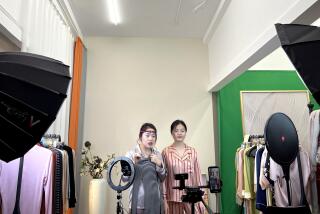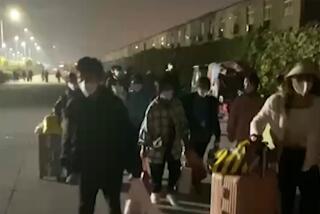iPhone fever probably won’t spread in China
BEIJING — When the iPhone was released in the United States two years ago, thousands camped outside Apple stores overnight to secure one of the prized devices. The official launch of the trendy handset in China this month isn’t likely to spur the same zealotry. That’s because the iPhone is already here.
Over the last two years, while Apple Inc. was tied up in negotiations with a Chinese carrier to bring the iPhone to the Middle Kingdom, nimble entrepreneurs were busy importing Apple handsets manufactured for the U.S. and Hong Kong markets.
They downloaded software to make the phones compatible with local networks, switched the language settings and -- voila -- the Chinese iPhone was born. Travelers coming back from their trips abroad also smuggled the coveted devices into the country.
The result: an estimated 1.5 million so-called gray-market iPhones are in use in China.
Then there are the iPhoneys. Shoppers can walk into any electronics bazaar in Beijing and buy a counterfeit iPhone for as little as $50. These pirated devices aren’t the equals of the real thing, of course. It takes thumb-wrestling strength to get some of the touch screens to respond. And that e-mail icon? It’s just for show.
But for shoppers like Luo Qiang, a 32-year-old worker at the state electric company, just the appearance of rocking a genuine-looking iPhone is enough.
“If I can have one that does more or less the same thing, why buy the more expensive, official iPhone?” said Luo, who recently purchased a fake one inside a chaotic Beijing shopping plaza.
Imitation may be the sincerest form of flattery. But whether the iPhone’s popularity in China will translate into big profits for Cupertino, Calif.-based Apple remains to be seen.
Official models sold without a carrier service contract, which is typical here, will be priced at about $735 -- far beyond the reach of average consumers. Add ferocious competition, Apple’s late start in China as well as its inability to control its own brand in the early going, and some analysts say the company’s success is far from certain.
“Apple is entering China at a level of competition that’s never been seen before,” said David Wolf, president of Wolf Group Asia, a Beijing tech and media advisory firm. “If they think they can come here and ride the wave they’ve enjoyed the last 2 1/2 years [in the West], then they’re going to get a rude awakening.”
An Apple spokeswoman declined to comment other than to confirm that the company had reached a multiyear agreement with mobile carrier China Unicom to sell the iPhone. The telecom operator is taking online pre-orders for the devices this month and plans to sell the phones at its retail outlets by Oct. 30.
Despite the challenges, the opportunity is enormous. China is the world’s largest cellphone market, with about 680 million mobile phone users. An increasing number are embracing sophisticated devices known as smart phones, which function like mini-computers by enabling users to access the Web and e-mail. Use of smart phones in China is expected to triple to around 116.2 million handsets by 2013, according to BDA China, a telecommunications consulting group.
Although only a small slice of China’s population has the means to purchase a genuine iPhone, that could still prove to be a success for Apple in a country with more than 1 billion inhabitants. For young professionals such as Beijing marketing executive Elton Lee, the iPhone that a co-worker brought him from Hong Kong is a must-have status accessory.
“People notice,” said Lee, whose handset sports a red rubber protector and a ringtone that sounds like a rotary phone. “They’ll say, ‘Ah, you have an iPhone.’ ”
Still, Chinese consumers may not develop the same cultish devotion to Apple as their American counterparts. The company’s other signature products -- iPod music players and Mac computers -- haven’t gained much traction here largely because of their premium prices.
Chinese bureaucracy hasn’t helped much either. Thanks to government restrictions that have since been lifted, the first wave of official iPhones manufactured for the Chinese market reportedly won’t be equipped with Wi-Fi, a feature that is critical for speedy, inexpensive Web surfing. Some analysts doubt that wealthy consumers would be willing to pay big bucks for Chinese iPhones that do less than jury-rigged gray-market ones.
Then there’s Apple’s lackluster telecom partner, China Unicom, which ranks a distant second to China Mobile and has a reputation for inefficiency and poor decision-making, analysts said.
Meanwhile, China Mobile, which controls 73% of the market, is gunning for Apple with its so-called OPhone. That’s the nickname for its new smart phone operating system based on Google Inc.’s much-touted Android platform. The goal is to attract Chinese customers to upgrade to so-called 3G technology that enables them to stream video, watch movies and enjoy other multimedia content on their phones.
Already, a slew of major manufacturers including Motorola, HTC and Samsung have signed on to supply China Mobile’s new line of handsets, dubbed OPhones, which will compete head-to-head with iPhone.
The first salvo arrives this month in the form of a smart phone built by Lenovo, China’s leading computer maker. The Lenovo O1 is a slim, black touch-screen phone that looks a lot like the iPhone. China Mobile has yet to announce the device’s retail price, but analysts are predicting that it will undercut iPhone sales.
Still, for the vast majority of Chinese consumers, purchasing a genuine iPhone or OPhone is out of the question. Cheng Guangming, a construction worker from Hubei province, sat outside a Beijing building site recently playing with a counterfeit Nokia phone he bought for about $120.
After showing a pair of onlookers how easily he could sign on to an instant messaging service to chat with his two sons, Cheng, 47, pulled an embedded 4-inch antenna out of the top left-hand corner of the phone.
“See, I can watch TV too,” he said, tuning in to a local Beijing station. “A knock-off is worth it. You get the same functions and more.”
Even Chinese consumers who can afford name brands are growing more fickle and hard to impress.
Xiao Zhuang, a 14-year-old who attends a prestigious middle school in Beijing, wowed her classmates months ago with a gray-market iPhone. Now, she said, the gadget was positively passe.
Never mind that students are forbidden to turn on their phones during school hours or that the devices are routinely confiscated by teachers. Having the latest model on campus, Xiao said, is essential.
“I don’t feel like the iPhone fits me,” she said. “I think I’m going to buy the Nokia N97 next.”
--
Tommy Yang and Nicole Liu in The Times’ Beijing bureau contributed to this report.







